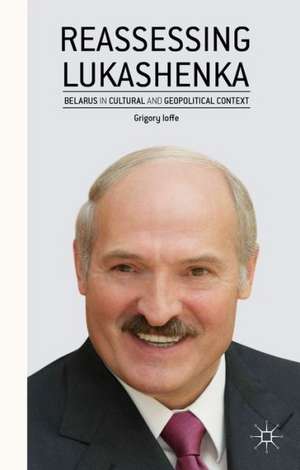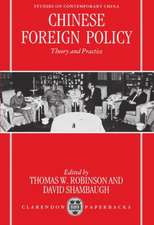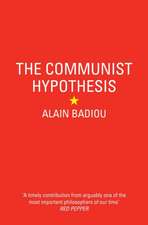Reassessing Lukashenka: Belarus in Cultural and Geopolitical Context
Autor G. Ioffeen Limba Engleză Hardback – 3 oct 2014
| Toate formatele și edițiile | Preț | Express |
|---|---|---|
| Paperback (1) | 386.22 lei 6-8 săpt. | |
| Palgrave Macmillan UK – 2014 | 386.22 lei 6-8 săpt. | |
| Hardback (1) | 393.52 lei 6-8 săpt. | |
| Palgrave Macmillan UK – 3 oct 2014 | 393.52 lei 6-8 săpt. |
Preț: 393.52 lei
Nou
Puncte Express: 590
Preț estimativ în valută:
75.30€ • 77.80$ • 62.64£
75.30€ • 77.80$ • 62.64£
Carte tipărită la comandă
Livrare economică 19 martie-02 aprilie
Preluare comenzi: 021 569.72.76
Specificații
ISBN-13: 9781137436740
ISBN-10: 1137436743
Pagini: 305
Ilustrații: XI, 305 p.
Dimensiuni: 140 x 216 x 25 mm
Greutate: 0.54 kg
Ediția:2014
Editura: Palgrave Macmillan UK
Colecția Palgrave Macmillan
Locul publicării:London, United Kingdom
ISBN-10: 1137436743
Pagini: 305
Ilustrații: XI, 305 p.
Dimensiuni: 140 x 216 x 25 mm
Greutate: 0.54 kg
Ediția:2014
Editura: Palgrave Macmillan UK
Colecția Palgrave Macmillan
Locul publicării:London, United Kingdom
Cuprins
1. Introduction 2. Belarusian Economy 3. Belarusian Society 4. Belarus and the West: From Estrangement to Honeymoon and Back to Estrangement 5. Lukashenka's Rise to Power and Belarusian Politics 6. Lukashenka's Personality and Worldview 7. Addendum: Interviews
Recenzii
“Real unique selling point for this publication comes in the lengthy addendum, taking up a quarter of the book, which includes the transcript of interviews the author held in 2011 with President Aliaksandr Lukashenka, the first and so far only president of post-Soviet Belarus. … The book paints a far more positive picture of life in contemporary Belarus than most other publications in English. … book does indeed highlight some issues that other scholarly works have often overlooked … .” (Matthew Frear, Europe-Asia Studies, Vol. 68 (2), March, 2016)
'In this refreshing rejection of globalist doxa concerning the march of democracy, Grigory Ioffe offers a balanced and informed account of one of the contemporary world's most successful political leaders, showing how Alexander Lukashenka has channeled the cultural imperatives of his countryand exploited Belarus's strategic position to craft a distinct socio-economic order whose overriding ethos is equality of condition'. - Michael Urban, Emeritus Professor of Politics, University of California, Santa Cruz, USA
"Wedged between Russia and Europe, Lukashenka has always played a delicate balancing act between Russia and the West in an increasingly important NATO borderland. Understanding that delicate relationship and what makes Belarus tick is the heart of what Grigory Ioffe addresses in his book. It is rare to find such exceptional research on such a difficult subject that is more objective and balanced than Ioffe's work on Belarus." Glen E. Howard, President, The Jamestown Foundation, USA
'In his new book, Grigory Ioffe pursues the ambitious task of explaining the political longevity of the Belarusian president Alexander Lukashenka. Following up on his 2008 study 'Understanding Belarus and Why Western Foreign Policy Misses the Mark', Ioffe dismisses any simplistic yet popular - explanations drawing on 'repression and fear' and uses unique material, his own personal interviews with Lukashenka, to present a much more informed and nuanced story. Focused on Belarus, the book makes an important contribution to the understanding of leadership in the post-Soviet region.' - Elena Gapova, Department of Sociology, Western Michigan University, USA and European Humanities University, Lithuania
'In this refreshing rejection of globalist doxa concerning the march of democracy, Grigory Ioffe offers a balanced and informed account of one of the contemporary world's most successful political leaders, showing how Alexander Lukashenka has channeled the cultural imperatives of his countryand exploited Belarus's strategic position to craft a distinct socio-economic order whose overriding ethos is equality of condition'. - Michael Urban, Emeritus Professor of Politics, University of California, Santa Cruz, USA
"Wedged between Russia and Europe, Lukashenka has always played a delicate balancing act between Russia and the West in an increasingly important NATO borderland. Understanding that delicate relationship and what makes Belarus tick is the heart of what Grigory Ioffe addresses in his book. It is rare to find such exceptional research on such a difficult subject that is more objective and balanced than Ioffe's work on Belarus." Glen E. Howard, President, The Jamestown Foundation, USA
'In his new book, Grigory Ioffe pursues the ambitious task of explaining the political longevity of the Belarusian president Alexander Lukashenka. Following up on his 2008 study 'Understanding Belarus and Why Western Foreign Policy Misses the Mark', Ioffe dismisses any simplistic yet popular - explanations drawing on 'repression and fear' and uses unique material, his own personal interviews with Lukashenka, to present a much more informed and nuanced story. Focused on Belarus, the book makes an important contribution to the understanding of leadership in the post-Soviet region.' - Elena Gapova, Department of Sociology, Western Michigan University, USA and European Humanities University, Lithuania
Notă biografică
Grigory Ioffe is Professor of Geography in the Geospatial Department, Radford University, USA. His research interests include Post-Soviet political developments and dictatorship, subjects on which he has published widely on. His previous books include Russia and the Near Abroad, Understanding Belarus and How Western Foreign Policy Misses the Mark (2008) and The End of Peasantry? The Disintegration of Rural Russia ( with T. Nefedova and I. Zaslavsky, 2006).















